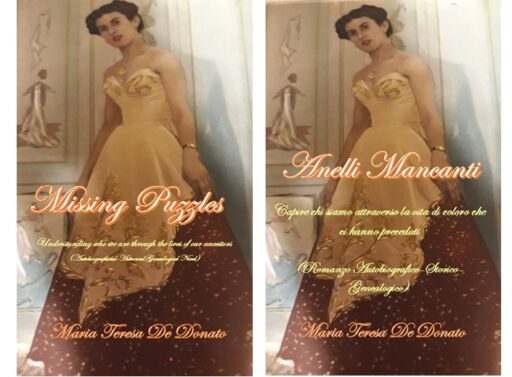Review by Giuseppe Storti
The Romans had the cult of ancestors.. The “mos maiorum”, literally: the ancestors’ customs, is the founding core of Roman civilization. The Romans jealously guarded the Lares and Penates in their homes. In every Roman domus, there were statuettes that symbolized the Lares who protected the family, while the Penates were guardian spirits of the family’s food reserves. A cult that was passed down from father to son.
The book by Dr. De Donato, which reconstructs the life of her ancestors in its dense plot backward, does nothing but revive a tradition and a culture that Western civilization has forged in its DNA. The story and reconstruction of one’s family’s past must be done exclusively by projecting one’s present into the past before time can inexorably erase its traces. We are nothing if we do not remember what we have been.
The description of the most important historical events that have characterized the history of the European continent is also very accurate. The pages on the origins of her father and mother are beautiful and very emotional, with considerations of the effects that the unfortunate event of the Second World War had on her nuclear family. Finally, the immense gratitude of a daughter for the love received and the conspicuous cultural heritage inherited from her family, with the load of traditions to respect and love.
It is an autobiographical novel based on the narrative thread of the so-called memoirs that are having great success in the contemporary publishing scene. A book to read precisely because it is a fitting example of the value of memory, which must be cultivated and loved and, above all, must be witnessed in the only possible way so as not to vanish: that is, with writing. The missing puzzle the author manages to find at the end of her careful research is precisely in that inestimable cultural heritage inherited from her large family.
This article was previously published at the following link
Anelli Mancanti – Romanzo di Maria Teresa De Donato
Recensione di Giuseppe Storti
I romani avevano il culto degli antenati Il “mos maiorum”, letteralmente: le usanze degli antenati, è il fulcro fondante della civiltà romana. I romani custodivano gelosamente in casa i lari e i penati. In ogni domus romana vi erano le statuette che simboleggiavano i Lari che proteggevano la famiglia. Mentre i Penati sono spiriti tutelari dei viveri di riserva della famiglia. Un culto che si tramandava di padre in figlio.
Il libro della dottoressa De Donato, che a ritroso ricostruisce nella sua fitta trama la vita dei suoi antenati, non fa altro che rinverdire una tradizione e una cultura che la civiltà occidentale ha forgiato nel proprio DNA. Il racconto e la ricostruzione del passato della propria famiglia, deve essere fatto esclusivamente proiettando il proprio presente nel passato. Prima che il tempo inesorabilmente possa cancellarne le tracce. Non siamo niente se non ricordiamo ciò che siamo stati.
Molto accurata è anche la descrizione degli eventi storici più importanti che hanno caratterizzato la storia del continente europeo. Bellissime e molto emozionanti le pagine sulle origini del proprio padre e della madre, con le considerazioni degli effetti che ha avuto sulla propria famiglia nucleare l’infausto accadimento della Seconda Guerra Mondiale. Infine l’immensa gratitudine di una figlia per l’amore ricevuto e per il cospicuo patrimonio culturale avuto in eredità dalla sua famiglia, con il carico di tradizioni da rispettare ed amare.
Un romanzo autobiografico che si innesca sul filone narrativo della cosiddetta memorialistica che sta avendo grande successo nel panorama editoriale contemporaneo. Un libro da leggere, proprio perché è un esempio calzante del valore della memoria, che va coltivata e amata, soprattutto va testimoniata nell’unico modo possibile per non svanirla: ovvero con la scrittura. L’anello mancante, l’autrice riesce alla fine a ritrovarlo al termine della sua accurata ricerca proprio in quel inestimabile patrimonio culturale ricevuto in eredità dalla sua grande famiglia.
Articolo pubblicato precedentemente al seguente link

